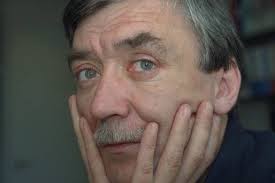The perceptible journey of IRA double agent, Sean O’Callaghan into the ranks of the neo-conservative movement appears to have taken on a more serious turn with his admission in a recent article in The Irish Times that his alienation from childhood hero James Connolly, a socialist leader of the 1916 Easter Rising, was inspired by an American philosopher some regard as the country’s first neo-conservative.
 |
For a graphic account of the disaster that is the modern neo-conservative movement there is no better person to turn to than Adam Curtis, whose film The Shadows In The Cave, describing similarities between neo-cons and Islamic radicalism, is a classic:
The Power Of Nightmares BBC 2 Part 3-3 - The Shadows In The Cave.wmv from Servant of Allah on Vimeo.
O’Callaghan, who was a key figure in the IRA’s Southern Command when he volunteered his services to the Garda Special Branch, and then turned himself in to British police, recently published an account of the life of the Irish Marxist and Irish Citizens Army leader, James Connolly titled: James Connolly: My Search for the Man, the Myth and his Legacy. (He also wrote The Informer, the story of his life of betrayal in the IRA.)
The thesis of his book on Connolly, who he says inspired him growing up in Co. Kerry, is that Connolly was a fanatic and that fanatics are essentially bad people who misled others, causing them personal harm and society damage.
O’Callaghan was roused to write the book, he confided in his Irish Times’ piece, when he revisited a book called True Believer, by an American writer called Eric Hoffer.
True Believer was a psychological analysis of mass movements and the fanaticism which can accompany them but its author is also seen in some circles as a neo-conservative at a time when there were no such people – the first neo-con, in other words.
 |
Hoffer was a strange and eccentric figure whose early life was something of a mystery according to his biographer, Tom Bethell, whose book, Eric Hoffer: The Longshoreman Philosopher, is one of the few studies of the man.
But according to Bethell, Hoffer was one the earliest manifestations of what would, four decades later, become chillingly familiar to the world clad in the ideological garments of neo-conservatism.
The turning point in his life, the point at which he made a sharp, fateful turn to the right, according to Bethell, was the student uprisings at Berkeley in 1964 and ’65:
…..by the 1960s – especially after his Berkeley experiences – he became what we would [now] call a neoconservative.
Other American conservatives also moved rightwards in response to radical mass movements in America at that time, notably Ronald Reagan who ran on a law and order ticket for California governor in the wake of the disturbances.
When Reagan made it to the White House in 1980 some of those he would bring with him to Washington would later re-emerge in the Bush administration either as signed-up neo-con zealots, like Paul Wolfowitz or fellow travelers, like Cheney and Rumsfeld.
Hoffer’s main claim to a place in the neo-con pantheon lay in his obsession with the survival of Israel which he outlined in a short essay written for the Los Angeles Times in 1968, a year or so after the Six Day War in the Middle East.
The concluding sentence of that essay could be regarded as the mantra of the neo-conservative movement, a mantra that underlines the roots of neo-conservatism in protecting and advancing the interests of the Israeli state, a truth that is rarely acknowledged in polite company:
I have a premonition that will not leave me; as it goes with Israel, so will it go with all of us. Should Israel perish, the holocaust will be upon us.
What a strange arc has the journey of Sean O’Callaghan’s life taken that this is where he has ended up?







When O'Callaghan is mentioned in the media it always seems to be him trying to excuse his treachery......irrespective what he says, does or writes he will always be a British tout to all Irish people even his the likes Dudley Edwards wouldn't have him about the place...you couldn't trust the fellow!
ReplyDelete